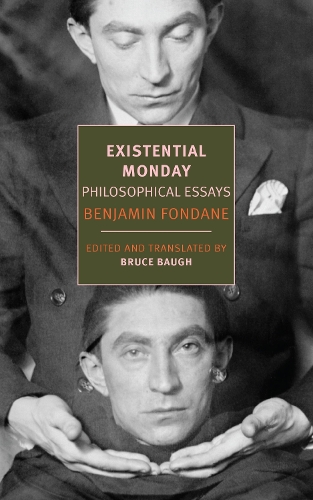
Existential Monday
(Paperback, Main)
Publishing Details
Existential Monday
By (Author) Andrew Rubens
By (author) Benjamin Fondane
By (author) Bruce Baugh
New York Review Books
NYRB Classics
15th June 2016
12th July 2016
Main
United States
Classifications
Tertiary Education
Non Fiction
194
Physical Properties
Paperback
176
Width 130mm, Height 205mm, Spine 10mm
184g
Description
Benjamin Fondane, who was born and educated in Romania, moved as an adult to Paris, lived for a time in Buenos Aires, where he was close to Victoria Ocampo, Borges's friend and publisher, and died in Auschwitz, was an artist and thinker who found in every limit, in every border, "a torture and a spur." Poet, critic, man of the theater, movie director, Fondane's thought took a philosophical turn in 1930s, which made him a major interlocutor - alongside such figures as Andre Breton, Albert Camus, and Simone Weil - in that decade's desperate intellectual, political, and spiritual debates. In this company Fondane stood out as the most daring of the existentialists, a metaphysical anarchist, affirming life and the individual against those great universal abstractions which limit human freedom - the State, History, the Law, the Idea; a rebel who refused the stable identity conferred by any form of "belonging" to some larger group or institution, "ferociously unique, outside of all categories." Existential Monday is the first selection of Fondane's philosophical work to appear in English. Comprising four major essays, it reveals Fondane, until now little-known except to specialists, to be of the great French philosophers of the twentieth century.
Reviews
Fondanes polemical approach confronts the reader with some explosive turns of thought which may lead us to reconsider everything we took for granted about life and art.Andrew Rubens, Glasgow Review of Books
Fondane . . . deserves to be celebrated outside France . . . as his far-ranging gifts and accomplishments are at the heart of 20th-century Jewish artistic and philosophical modernism.Benjamin Ivry, The Jewish Daily Forward
I was seized by the force of his images anchored in carnality, and I had the feeling of listening to a voice that was both unique and powerful, the voice of a man who, unworried by literary effect, shouted out his human condition.Michel Carassou
Author Bio
Benjamin Fondane (1898-1944), born Benjamin Wechsler, was a French-Romanian intellectual and surrealist poet. In 1923, Fondane fled from Romania to France, wherehe became part of a vibrant philosophical and intellectual network of Marxists, Catholics, Protestants, surrealists, and existentialists. Fondane also spent time in Buenos Aires, butreturned to France where he worked until his arrest in 1944, after which he was deported to Auschwitz, where he was killed. Bruce Baugh is the author of French Hegel: From Surrealism to Postmodernism and a professor of philosophy at Thompson Rivers University (Kamloops, BC, Canada), where he specializes in 20th-century French thought. Andrew Rubens is currently writing a doctoral thesis on Benjamin Fondane at the University of Glasgow, Scotland. He is also translating Fondane's poetry in collaboration with Henry King; selections appear in New York Review Books' Fondane anthology. His other translation work includes an essay by the philosopher Jean-Luc Marion and a biography of Jean Genet by the writer Dominique Edde. He is a former editor of the postgraduate journal eSharp and occasionally writes for The Glasgow Review of Books. He is also a founding member of the Association Benjamin Fondane.
